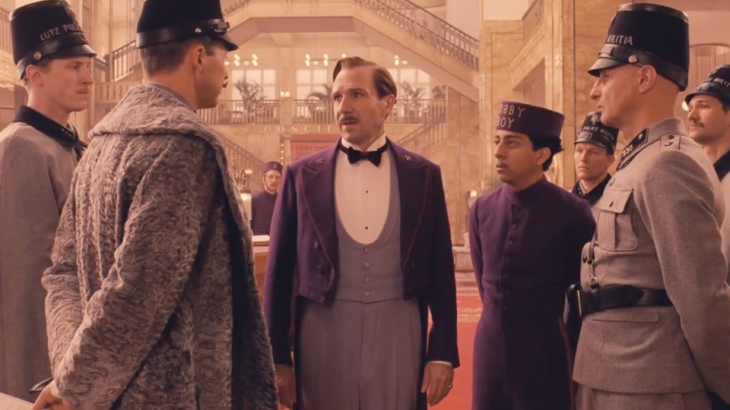Generally speaking, I like Wes Anderson. I’ve seen Rushmore, The Royal Tenenbaums, and The Life Aquatic. From those experiences, I can confidently gather that, if he and I were ever to meet over coffee for an hour or two, there is a lot of potential for pleasant conversation. We can talk about Salinger, Peanuts, ’60s and ’70s music, our favorite color palettes, our thrift store finds, and so on–it wouldn’t be too shabby, is what I’m trying to say.
Which leads me to wonder: Do I actually like Anderson’s films, or do I simply just think he has impeccable taste? It is 2014, and we’re all still wondering whether or not Anderson is style or substance.
Perhaps The Grand Budapest Hotel could answer this once and for all. It is certainly one of Anderson’s most tightly-plotted films and shows his incredible growth as a storyteller, transcending from his usual status as a platonic paramore of his own creations. Of course, it contains all the usual Anderson trademarks–quirk, whimsy, wit, and nostalgia–but he’s figuring out how to use his trademarks to complement his stories, rather than dominate them. However, the film still struggles to be much more than a bittersweet lullaby.
The film follows the adventures of Gustave (Ralph Fiennes), a dedicated concierge at the Grand Budapest Hotel, and his trusted lobby boy, Zero (Tony Revolori). The plot unravels when Gustave inherits a famous painting, “Boy with Apple,” after the death of his extraordinarily wealthy, but enigmatic lover, Madame D (Tilda Swinton). Madame D’s family members are displeased with her decision, especially her sinister son Dmitri (Adrien Brody), who subsequently tries to make Gustave’s life a living hell. Gustave enlists his trusted Zero’s help in these times of desperation and the two grow ever closer to each other.
And to tell you any more about the story would spoil all that Anderson has to offer. Here, he’s made a film that’s meticulous, not only by design and characters, but also by plot. I admire that. Even if you don’t care for Anderson’s affinity for mid-twentieth century decor, there is a lot to be said about his willingness to not only be meticulous, but also unique.
Anderson also possesses a keen talent for characterization, which is probably why so many great actors are attracted to being in his films. No matter how minor the role, the actors seem to get an opportunity to chew the scene up. In addition to Brody’s wonderfully fun performance as the sinister son, some other highlights include Edward Norton as the police inspector, Saoirse Ronan as Zero’s love interest, and F. Murray Abraham as the older Zero. But, most evidently, the film belongs to its star, because, who knew Fiennes had such great comedic timing? Anderson wrote Gustave as a larger-than-life character and Fiennes convinces us that that Gustave H is a larger-than-life character, with all his contradictions and charisma. And newcomer Revolori adequately keeps us with Fiennes’ antics, providing some necessary humanity in a cast of established eccentrics.
Despite Anderson’s recent foray into giving great care to the plot, this film still feels warily episodic. Sure, there is an arc that ties everything together, but it also largely relies on the mechanics of dramatic irony. This just demonstrates that Anderson still cares more about his characters’ journeys, rather than their ultimate destination–and should it be this way? Compare Anderson to his fellow writer/director contemporary, Christopher Nolan, whose characters seem to be purely ornamental to his story, and you get an idea of the kind of filmmaker is and isn’t. Anderson often explores the nature of emotional restraint, but to what end?
Anderson purposefully doesn’t tread across certain territories, and that is part of the beauty and part of the frustration of his films. He asks his audiences to take things at face value–things just are. He wants to leave several doors unopened. There’s a sense of dishonesty and superficiality to that. He’s fine with his scenes being a little absurd and his characters being a little cartoonish–it’s all part of the fun. But, like his characters, it’s almost as though he’s restraining himself from exploring his own possibilities as a filmmaker. He’s cynical, but not too cynical; he’s hopeful, but not too hopeful; he’s ambitious, but not too ambitious. For all the stylistic extremes Anderson seems to relish in, the tone of his films perpetually oscillates between extremes, much like his characters’ emotional states.
That being said, The Grand Budapest Hotel is a fine film. It tells and engaging story, is an aesthetically beautiful film, the performances are zany and lovable, and Alexandre Desplat’s score suits the film well. But something is being unfairly withheld, and until Anderson could express that, his films would continue to wield an unfortunate ratio of style over substance.
